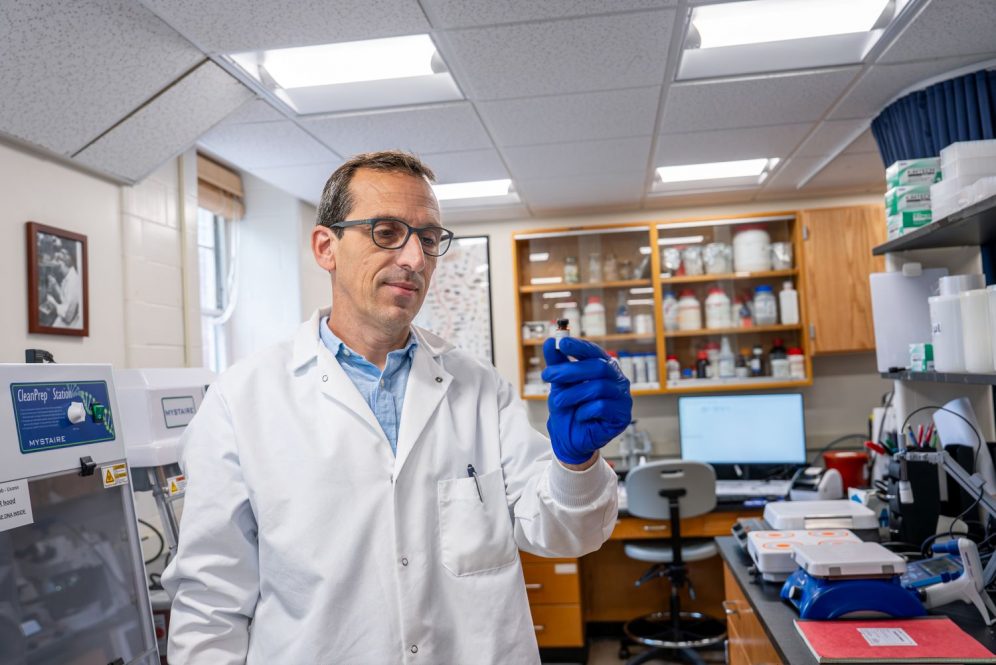Elsio Wunder, assistant professor of pathobiology and veterinary science in the College of Agriculture, Health and Natural Resources (CAHNR), has filed a patent for a vaccine against leptospirosis that uses a unique combination of highly conserved proteins.
This filing represents Wunder moving one step closer to developing a universal vaccine for leptospirosis, a widely neglected disease. Last year, Wunder received a $3.8 million grant from the National Institute of Allergy and Infectious Diseases (NIAID) to pursue this goal.
Leptospirosis is a bacterial infection that causes flu-like symptoms and can be life-threatening. Leptospirosis causes an estimated 60,000 human deaths a year. The disease is spread through contact with the urine or other bodily fluids of infected animals, including via contaminated water or soil.
Since leptospirosis mainly affects poorer regions of the world, little scientific attention has been given to it, and there is no vaccine available for humans, making Wunder’s work critical in filling this public health gap.
Existing animal vaccines for leptospirosis use inactivated whole cells of the bacteria. One big problem with this approach is that there are dozens of pathogenic species of Leptospira, the bacteria that causes leptospirosis. This means vaccines incorporate multiple strains that constitute the best guess scientists have about what variants are circulating in a given population. These vaccines also have significant side effects and immunity wears off quickly.
Another major problem with existing vaccines is that they can protect animals against disease and death from leptospirosis, but they are not good in preventing the bacteria from colonizing their kidneys. This means an infected animal can still spread the disease to other animals and humans through their urine.
Wunder’s vaccine takes a new approach using a series of recombinant proteins. Proteins that are highly conserved across variants of a pathogen usually perform essential functions for the pathogen. A vaccine that targets this kind of protein would provide broad immunity across strains.
“There has been a struggle to identify a recombinant protein that would be protective, effective, and also have a broad reach,” Wunder says.
Wunder previously developed a leptospirosis vaccine using an attenuated, or weakened, form of pathogenic bacteria. While this vaccine was effective to an extent, more importantly, the research Wunder did while developing it allowed him to identify which proteins generated antibody responses. This gave him a list of candidates for a recombinant protein vaccine.
Wunder has now patented a vaccine that uses four recombinant proteins to provide protection against a wide range of leptospirosis-causing bacteria.
“In the back of my mind, I always thought one candidate would not be enough,” Wunder says. “We’re talking about bacteria that has over 4,000 proteins expressed.”
Using rat, hamster, and mouse models, this multi-recombinant protein vaccine provided significant protection, up to 100% at certain doses, against death from a wide variety of Leptospira species. It also prevented bacterial colonization.
Wunder is currently working with veterinary companies who may be interested in using these proteins to develop an animal vaccine for leptospirosis while working toward a vaccine that is safe for use in humans.
“The ultimate goal is to have a vaccine that is available for humans, especially because this disease is a major burden in developing countries,” Wunder says.
These candidates could also be a useful diagnostic tool. Leptospirosis symptoms resemble many other tropical diseases present in the areas in which it circulates, leading to frequent misdiagnoses. The only way to definitively test for leptospirosis at present involves a technically complicated and expensive process that only a few labs in the world can do.
There are some simpler assays that can test for leptospirosis. But they are not very accurate and do not work for animals if it has been vaccinated. Using the highly conserved proteins in Wunder’s vaccine candidate could provide a better way of testing for the presence of infection even in vaccinated animals.
Fast, early, and accurate diagnosis is critical in leptospirosis cases as the disease is treatable with antibiotics if caught early.
“A lot of times people are misdiagnosed, and it can lead to an increase in mortality,” Wunder says. “We saw that we can actually use some of those candidates as a diagnostic tool. So, we’ll be investigating that as well.”
With the increase of temperature and floodings, more cases of leptospirosis in humans and animals are occurring in the US, and the search for better vaccines and diagnostic tools are essential to reduce the impact of this important disease.
This work relates to CAHNR’s Strategic Vision area focused on Enhancing Health and Well-Being Locally, Nationally, and Globally. The patent was filed by Yale University when Wunder worked there as a research scientist.
Follow UConn CAHNR on social media



